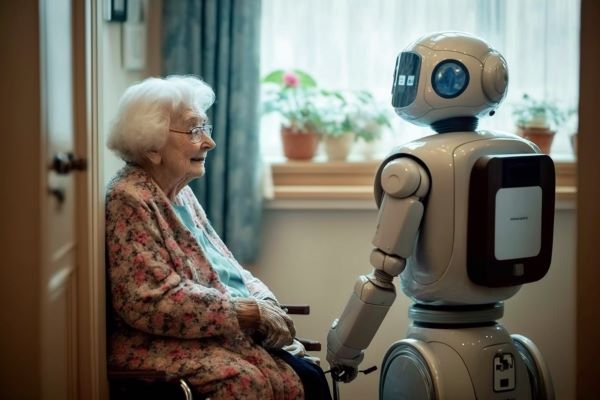LASA stands for "look-alike-sound-alike" and is commonly used when referencing medications in healthcare. Both Medicare…

An Overview of Artificial Intelligence and the Aging Population
Artificial intelligence tools are revolutionizing senior care. Health aides are needed to provide consistent and competent care to an aging population. In the United States, the healthcare industry employs over 4.5 million nursing aides, orderlies, home health aides, and personal care aides, and yet it’s not enough to address the future needs of older Americans. New solutions are being developed using artificial intelligence to meet the demand.
Robotic Companions
In 2017, the National Science Foundation provided a one million dollar grant to Brown University and Hasbro Inc. to develop furry animatronic cats and dogs coupled with artificial intelligence to assist seniors in their daily lives. The project’s team was tasked with designing a smart companion capable of helping older people with the simple yet sometimes challenging tasks of everyday life. The project was called ARIES (Affordable Robotic Intelligence for Elderly Support), and in addition to providing support for daily tasks, the smart companions also provide comfort and joy for older adults, particularly those with mild dementia problems.
ToyotaVentures also began in 2017. It funds companies working on digital health and mobility using artificial intelligence. It was also a major investor in another aging companion, ELLI.Q. This artificial intelligence elder care robot uses machine learning and vision-enabling technology to make suggestions to its senior friend, recommending entertainment and activities in addition to monitoring the overall health and wellness in their environment. It’s a more robust system than using Alexa or Siri, as it has the added benefit of vision and capability to tailor information to the needs and schedule of the senior it supports.
Startup Health Care Technologies
In 2021, AARP began AgeTech Collaborative to support startups with corporate research and development into the applications of artificial intelligence to benefit the aging population. Their goal is to help new companies create products, services, and experiences that promote longer, healthier lives so people can choose how they want to live as they age.
The future of artificial intelligence application in senior care is rapidly advancing. From care bots for in-home companions to smart devices that monitor a senior’s health and daily activities like toileting and bathing, caregivers can be alerted to behavior changes and medical or safety issues quickly. The elderly can have a sense of autonomy and independence, and families have peace of mind that someone can react immediately to their loved one’s needs if something goes wrong. Whether an older adult falls at home or someone with dementia wanders from their room in a memory care facility, it reduces the family or caregiver’s physical and emotional stress of checking in around the clock.
Where Are We Headed?
Technology for seniors has been around since life alerts and nanny cams, but AI uses sensors to collect data to monitor and analyze situations. It detects if something is wrong and sends an alert to the caregiver. However, with new technologies come new concerns for privacy and accuracy. Artificial intelligence and smart systems also shouldn’t replace the need for human interaction and hands-on care or worsen the social isolation many elders experience.
If you have questions about anything you’ve read or would like to make an appointment to discuss long-term care planning needs for you or a loved one, please don’t hesitate to reach out. Our elder law attorneys are dedicated to keeping you informed of issues that affect seniors.
We hope you found this article helpful. Please contact our Nashua office at (603) 881-9161 or our Woburn office at 978-458-4566 and schedule a consultation to discuss your legal matters. We look forward to the opportunity to work with you.



